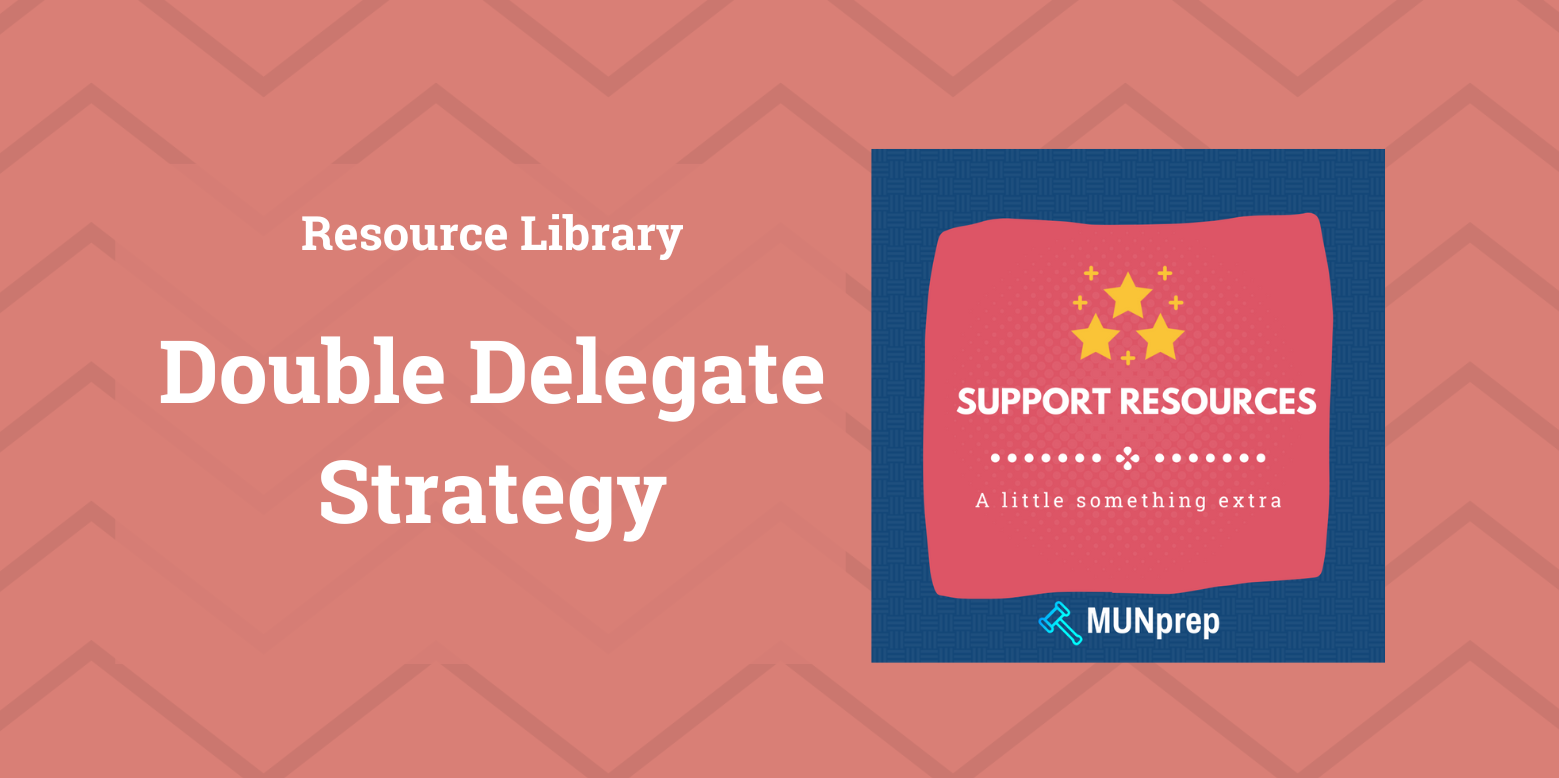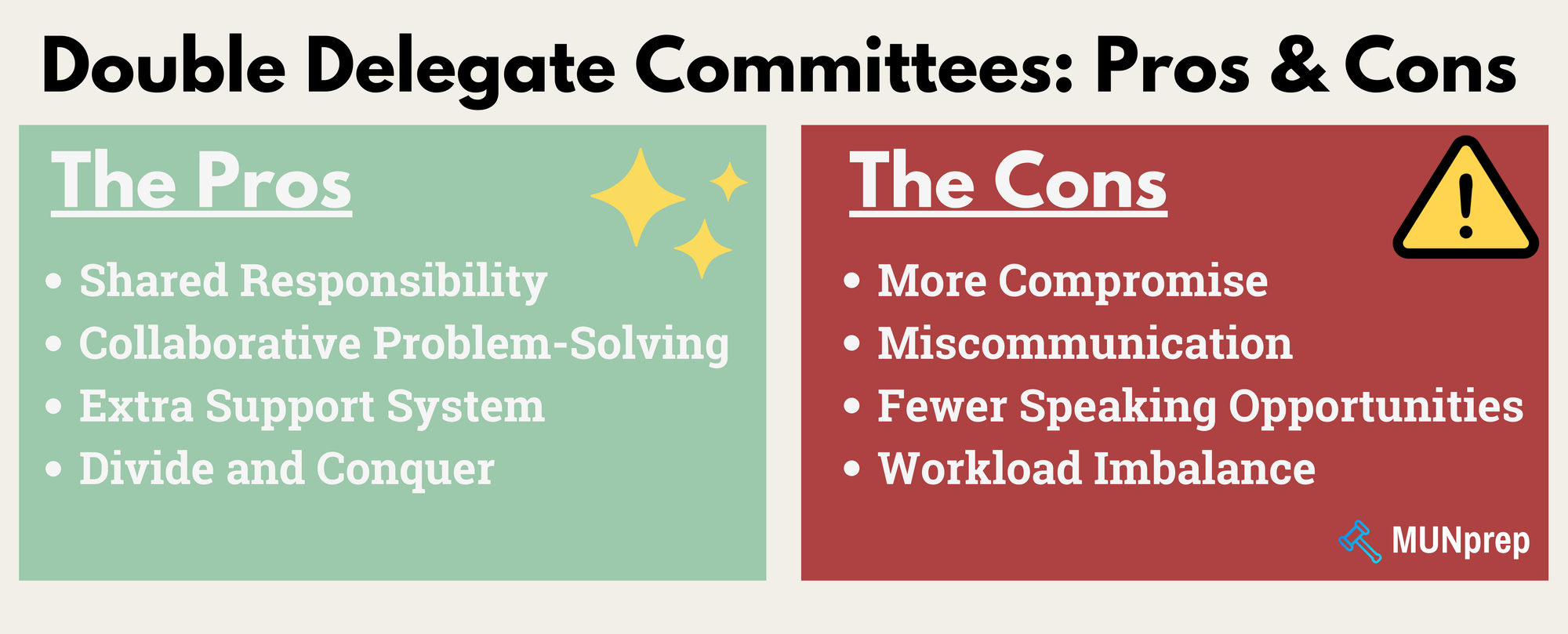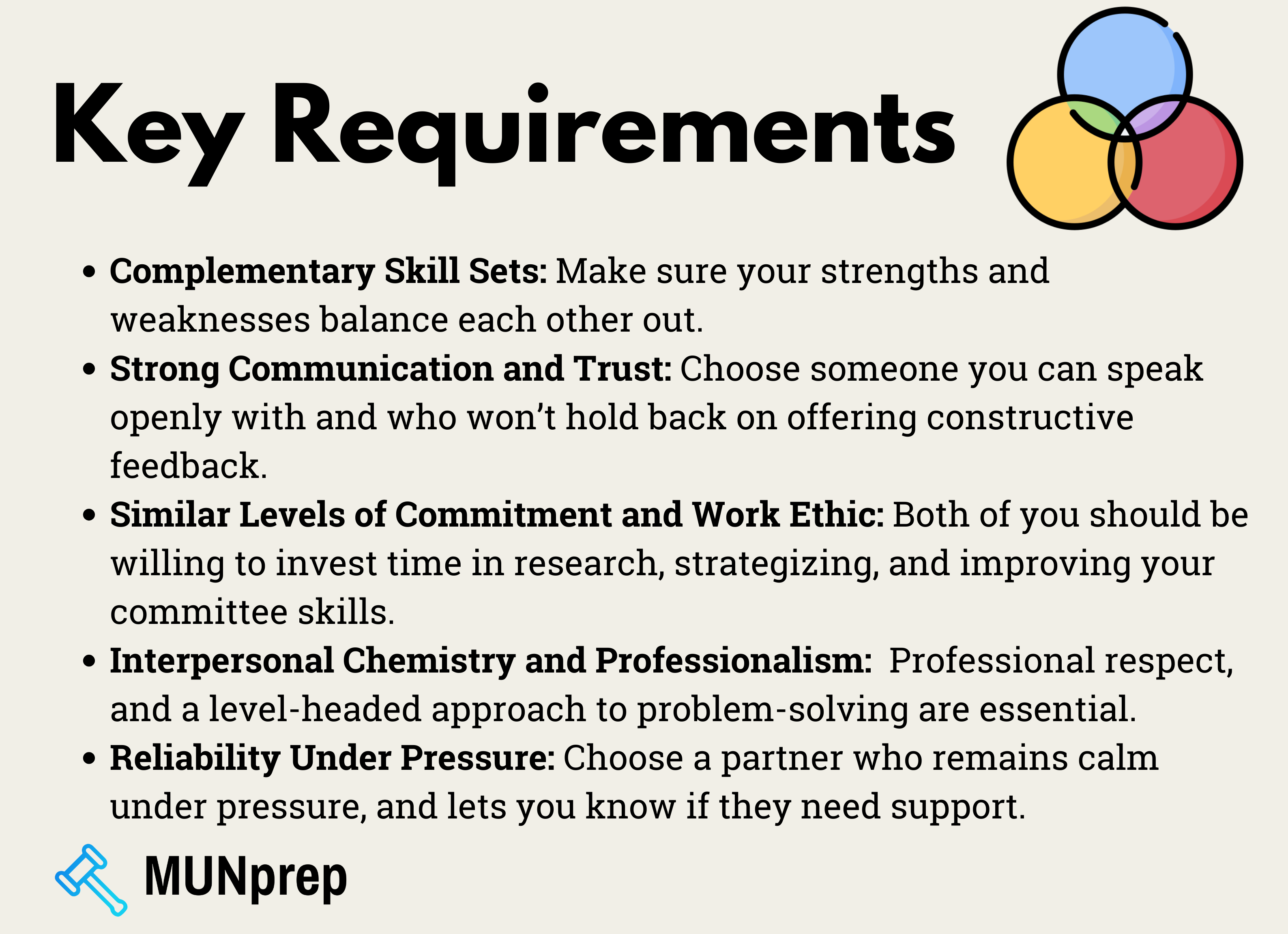Double Delegates - Working With a Partner in MUN

Double Delegating—where two people represent a single country in a Model United Nations committee—offers a unique and dynamic MUN experience. It comes with its own set of challenges and opportunities, but with the right preparation and mindset, you and your partner can make your delegation twice as impactful!
In this guide, we’ll explore how to start off on the right foot with your partner and share tips to ensure the two of you work together as a dream team rather than a disaster duo.
Working With a Partner - Positives and Negatives
Working with a partner can be an awesome experience - On one hand, you gain a partner who shares the workload, brings complementary skills to the table, and expands your delegation’s reach across the committee room.
On the other hand, it can also bring its own set of challenges since you'll need to work overtime to maintain open lines of communication, ensure consistent policy stances, and appear as a cohesive, united front.
Committees large and small demand that double delegates stay flexible, trust each other completely, and continually adjust their strategies. Conflicting approaches, an uneven skill balance, or lapses in communication can all compromise your chances of success.

Choosing the Right Double-Delegate Partner
You won't always be able to choose your partner, and frankly we don't think that's always the most important thing.
Here are a few things you should keep in mind:

1. Complementary Skill Sets:
A good double-delegate team features partners whose strengths and weaknesses balance each other out.
2. Strong Communication and Trust:
Even more important than raw skill is the ability to trust and communicate with your partner. Successful double delegations rely on near-constant information exchange—after any unmoderated caucus, you should be talking about who you've been working with and can chart a way forward together. You should also be able to trust their opinion on delegates to work with, as well as those to avoid.
3. Similar Levels of Commitment and Work Ethic:
You may be highly motivated to research, attend practice simulations, and put in the extra hours of preparation—make sure your partner matches that commitment.
A partner who is unwilling to prepare thoroughly or is just going to “wing it” can leave you feeling overburdened. Both of you should be willing to invest time in research, strategizing, and improving your committee skills, ensuring a united effort from start to finish.
4. Interpersonal Chemistry and Professionalism:
While you don’t need to be best friends, you should have a comfortable working rapport. You’ll spend hours together researching, debating, and making strategic decisions.
Personal friction will seep into your performance. Professional respect, the ability to compromise, and a level-headed approach to problem-solving are essential qualities of a great double-delegate partner.
5. Reliability Under Pressure:
Committee sessions can be unpredictable and stressful. Choose a partner who remains calm under pressure, can adapt when plans change, and keeps you informed if they need support. In a perfect world, both delegates are resilient and proactive, pushing through setbacks and using them as opportunities to recalibrate rather than reasons to give up.
Pre-Conference Preparation
Here are a few things you should do so you can divide and conquer!
1- Researching as a Team
Start all of your conference prep as a team. While it might be tempting to assign one topic to each partner, both delegates must be well-versed in every issue on the agenda.
This shared knowledge ensures that if you switch roles during the conference—such as one stepping in for the other during a speech—you are both prepared.
2- Defining Individual Strengths and Weaknesses
Be honest about what each of you does best. Is one of you a confident public speaker? Are you skilled at writing clauses and draft resolutions? Perhaps one of you is better at striking up friendly conversations and building alliances quickly.
Identifying these strengths early will help you plan how to divide responsibilities for maximum impact.
3- Sharing Responsibility
Though not set in stone, and its best to make sure everyone can do a little bit of everything, it is often useful to decide who will initially serve as the “in-room” delegate and who will serve as the “out-room” delegate.
- In-Room Delegate: Mainly focused on delivering speeches, synthesizing what’s happening in formal debate, and communicating key intel back to their partner. This role is often suited to a strong public speaker who can control the flow of debate.
- Out-Room Delegate: Specializes in networking outside the committee room during unmoderated caucuses, drafting and refining working papers, building coalitions, and advancing your resolution. A great negotiator and a skilled writer is ideal for this role.
Keep in mind that these roles can switch if needed. Chairs often appreciate seeing both delegates excel at multiple tasks, so be flexible.
4- Determining the Opening Speaker
The opening speech sets the tone for your delegation’s participation. If one delegate is notably stronger in public speaking, let them deliver the first remarks. The opening speech should present your country’s position clearly, highlight key issues, and demonstrate your preparedness.
Check out our opening speech formula here!
In-Conference Tactics and Best Practices
Once you've finished with your conference prep, it's time to actually step into your first MUN conference as a team!
There are a few strategies you can keep in mind depending on the situation, and committee type.
Managing Both Large and Small Committees
- In Large General Assemblies: The room may be filled with a hundred or more delegates, making visibility a challenge. Since speaking slots will be limited, use the out-room delegate strategically to build multiple alliances. Meanwhile, the in-room delegate should be ready to jump on speaking opportunities when they arise. Maintaining a constant line of communication (through note-passing, shared digital documents if allowed, or quick whispered consultations) ensures that both of you know what the other is working on.
- In Smaller Committees: Everyone is under the spotlight, so any imbalance in work or visibility becomes glaringly obvious. Both delegates need to be actively engaged at all times. The speaker should not monopolize every speech, and the negotiator should not remain silent in the room. Rotate who speaks so both are seen contributing. Show the chair that you work as a unified, complementary pair by sharing responsibilities and supporting one another’s efforts.
Learn about different committee styles here!
Navigating the “In-Room” and “Out-Room” Dynamic
- The In-Room Delegate: Should master the art of synthesizing debate. Listen closely to other speeches, take notes on shifting alliances, and relay important information to your partner. If you must give an impromptu speech, you already have the knowledge base to adapt and deliver a persuasive point.
- The Out-Room Delegate: Uses unmoderated caucuses and breaks to form alliances, gather support for resolutions, and fine-tune working papers. Quick thinking is key; you must adapt to new developments as shared by the in-room delegate. Keep your partner updated, so they know which coalitions are forming and what concessions might be required.
Switching Roles and Maintaining Visibility
Though specializing is beneficial, switching roles periodically can be strategic. Perhaps the in-room delegate steps out to draft a crucial resolution clause or the out-room delegate comes in to deliver a targeted speech. Such flexibility shows the chair that both of you are well-rounded.
Continuous Communication and Avoiding Contradictions
Make use of discreet note-passing if using phones is not allowed. Keep messages simple and clear. If one of you negotiates a deal with another bloc, the other partner also needs to know.
Contradicting stances erode trust with allies and look disorganized to the chair. Even if your partner ends up doing something you don't agree with, go with the flow and deal with it later on.
Evaluating Your Progress and Adjusting on the Fly
Regularly ask yourselves: Are we achieving our goals? Do we need to gain more allies? Are we falling behind in drafting responsibilities?
If one delegate seems overwhelmed, the other should step in to help. If you sense the committee’s direction shifting, communicate immediately and adjust your strategy. Responsiveness and flexibility are vital.
Crisis Notes and Double Delegates
In double delegate crisis committees, it’s often more efficient for one delegate to take the lead on writing crisis notes while the other focuses on public speaking and debate.
This division of labor allows for smoother coordination and ensures that tasks are handled promptly. However, it’s crucial for both delegates to stay aligned—your partner should always be aware of the plans outlined in the notes and ready to provide input or advice.
Roundup: Key Points for Successful Double Delegations
- Trust: You and your partner must trust each other completely. Present a cohesive stance, never contradict one another, and resolve any disagreements privately.
- Thorough Preparation: Research and plan together. Both partners should be equally informed on all topics so either can step in as needed.
- Open, Constant Communication: Keep each other updated at all times, using notes or whispered consultations. Prevent contradictions by ensuring both partners know what deals have been made and where stances are shifting.
- Balanced Visibility: Both delegates should speak, negotiate, and draft. Even if one excels in a certain area, both must show presence and effort to impress the chair.
- Flexibility: Roles can switch, and strategies can evolve. Stay adaptable to changing committee dynamics and be prepared to take on new responsibilities if needed.
By embracing these guidelines—from early research sessions to the final day of debate—you can leverage the benefits of having two minds in one delegation. Your synergy, preparation, adaptability, and communication will set you up for an outstanding performance and a rewarding Model UN experience.
Good luck!






